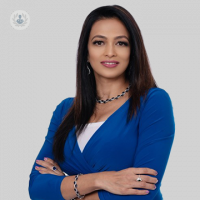Depression in young people: Seeking help
Written in association with:Depression is a mental health condition, characterised by prolonged feelings of sadness and hopelessness, that affects more than 280 million people worldwide.
Here to provide a comprehensive insight into depression, particularly in young people, is renowned consultant child and adolescent psychiatrist based in London, Dr Ramya Mohan.

How severe can depression become?
If left untreated, unfortunately, depression can have a profound impact on an individual, their family, their workplace... All areas of life can be affected adversely.
What are the main known causes of depression?
Depression is multifactorial, and both nature and nurture can have a role in it.
There can be a genetic component, but other triggers as an individual grows up – whether developmental trauma or multiple life events – can all lead to the development of unhealthy coping skills, thought patterns and behaviours that contribute to depression.
Sometimes, depression is a complex interplay of nature and nurture.
Why are some people more vulnerable to depression than others?
Again, it is a combination of factors. It could be an innate vulnerability in temperament or genetics. It could be cumulative trauma or cumulative adverse events that over time can lead to an avalanche effect when it comes to depression.
There are also genetic, social, psychological and demographic triggers that can set of depression or make an individual more susceptible to developing depression. Of course, if an individual hasn't learnt the right coping skills or if an individual is still in the process of understanding what is happening to them, then that can make things significantly worse.
When should I visit a specialist for depression?
Treatment for depression starts by understanding what is happening.
Once a clinical diagnosis has been made, the next step is to determine how an individual can strengthen themselves in every possible sense. This is best attained through a timely and comprehensive assessment with a mental health specialist.
Particularly, children and young people are usually at the centre of an ecosystem that can be harnessed to provide support and optimise recovery. In these cases, it becomes all the more important to see a child and adolescent mental health specialist, such as a child psychiatrist, in a timely manner.
How is depression managed most effectively, especially in children?
There are a variety of approaches depending on the age and the developmental stage of the child. The first step is for the child and the mental health specialist to have a collaborative discussion.
Once the child has been evaluated using a comprehensive mental health assessment, it is usual practice to start off therapeutic interventions and provide additional support with medication.
The management of depression usually involves collaborative conversations between a mental health specialist, the child, and the child’s parent/guardian.
If your child has been living with depression, don’t hesitate to reach out to Dr Ramya Mohan via her Top Doctors profile today to receive expert assessment, treatment and support.


